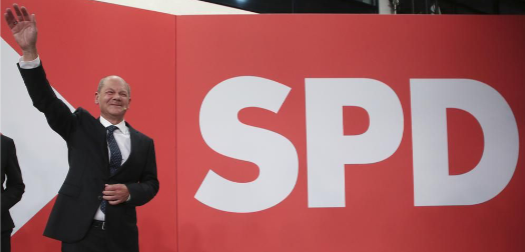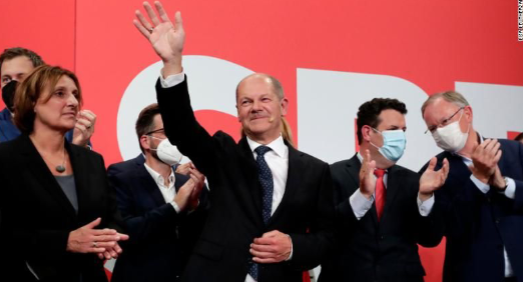
Germany’s left-leaning Social Democratic Party (SPD) will begin negotiations to form a ruling coalition after preliminary results showed the party narrowly winning the largest share of parliamentary seats following Sunday’s Federal
Election.
With all 299 of Germany’s electoral districts reporting, the SDP won 25.7% of the vote, beating out the Christian Democratic Union (CDU), the centrist- right, conservative party of Chancellor Angella Merkel, which posted record
losses by taking 24.1%, according to the Federal Returning Officer.
But there is still uncertainty over who will be the next leader of Germany. Both the SPD and the CDU with its coalition partner, the Christian Social Union (CSU), have said they want to begin coalition negotiations to form a
new government.
Likely coalitions in Germany will either see the SPD or CDU/CSU forming a government with the Green Party, which took 14.8% of the votes, or the liberal Free Democratic Party (FDP), with 11.5%.
Merkel, who over 16 years cemented her position as one of the world’s most successful political leaders, will stay in job until a coalition deal is negotiated– and that could take months.
After Merkel’s election win in September 2017, it took more than five months for a government to be formed.

party’s headquarters in Berlin, on September 26.
Though the preliminary count gives the SPD a small lead over its closest rivals, the results mark a significant improvement for the party that took 20.5% of the vote in the last election in 2017.
Its leader Olaf Scholz said voters wanted him to be next chancellor.
“Many citizens have put their crosses next to the SPD because they want there to be a change in government and also because they want the next chancellor of this country to be called Olaf Scholz,” he
said in remarks at his party’s headquarters
The 63-year-old politician has served as the vice-chancellor and German finance minister in Merkel’s grand coalition government since 2018, earning him increased visibility as he navigated Germany’s economic response to the
pandemic.
“Pragmatism, optimism, unity that is what we will show because that is what counts, and I am sure the citizens will also be happy post-election about their decision,” Scholz added.
By contrast, the CDU leader Armin Laschet told supporters, the party “cannot be content with this result,” while noting that the final result remained unclear.
“We can foresee that there could be a government with three parties,” he said, adding the party would “do everything to try to build a coalition.”
Laschet added that the CDU had “got a mandate against a leftist government.
The party had campaigned on a message of stability for the country after Merkel, seen as a steady pair of hands over the past nearly 16 years, steps down. But it is now coming to terms with what it itself called a bitter night of losses.
What comes next
The outgoing government remains in office as acting government until it is replaced by a new government. Merkel, 67, will then stand down and the new chancellor will take the reins. According to tradition, the leader of the strongest party will have the first shot at trying to form a government.